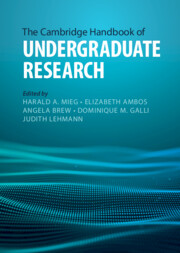Book contents
- The Cambridge Handbook of Undergraduate Research
- The Cambridge Handbook of Undergraduate Research
- Copyright page
- Contents
- Figures
- Tables
- Contributors
- Foreword
- Foreword
- 1 Introduction
- Part I Theory and Research on Undergraduate Research
- Part II Implementation, Approaches, Methods
- Part III Disciplines
- Part IV International Perspective
- Part V Avenues for Developing Undergraduate Research
- Index
- References
9 - Four-Component Instructional Design Model, Maastricht
from Part II.1 - Implementation Models in Undergraduate Research
Published online by Cambridge University Press: 11 August 2022
- The Cambridge Handbook of Undergraduate Research
- The Cambridge Handbook of Undergraduate Research
- Copyright page
- Contents
- Figures
- Tables
- Contributors
- Foreword
- Foreword
- 1 Introduction
- Part I Theory and Research on Undergraduate Research
- Part II Implementation, Approaches, Methods
- Part III Disciplines
- Part IV International Perspective
- Part V Avenues for Developing Undergraduate Research
- Index
- References
Summary
The Maastricht Research Based Learning program for Excellence (MaRBLe) is an extension of Maastricht University’s leading educational approach, that is, Problem-Based Learning (PBL). PBL emphasizes that learning should be constructive, take place in context, in collaboration with others, and driven by self-direction. The 4C/ID model has proven to be helpful to identify shared principles for Research-Based Learning (RBL). These principles has proven very supportive in the transition from PBL to RBL, and to work toward further harmonization of the RBL practices at Maastricht University without jeopardizing the way they are tailored to the needs of a particular scientific domain, students in this domain, as well as other conditions. RBL was introduced via a true bottom-up approach, giving room to early adaptors that functioned as pioneers in their faculty. Lessons learned vary from the necessity to have a stable community of practice as a basis for exchange and further development and the focus on empowering students in the development of their academic research skills.
Keywords
Information
- Type
- Chapter
- Information
- The Cambridge Handbook of Undergraduate Research , pp. 101 - 107Publisher: Cambridge University PressPrint publication year: 2022
References
Accessibility standard: Unknown
Why this information is here
This section outlines the accessibility features of this content - including support for screen readers, full keyboard navigation and high-contrast display options. This may not be relevant for you.Accessibility Information
- 1
- Cited by
